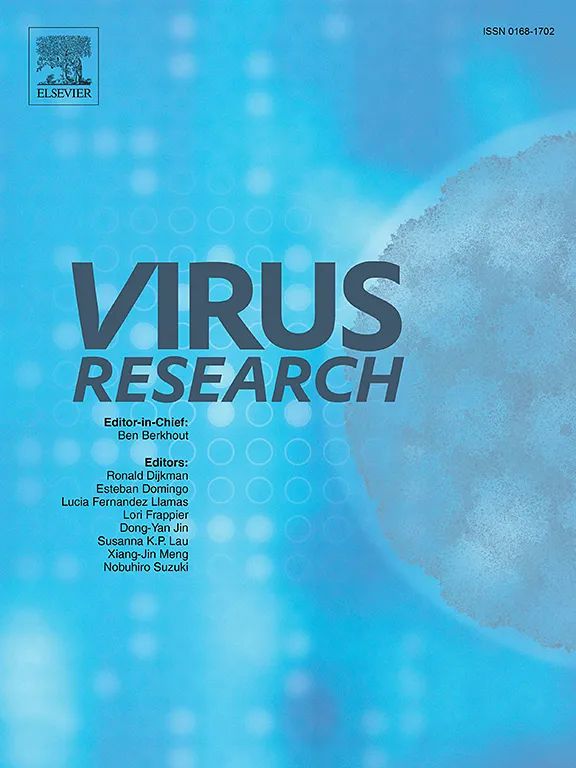Evaluation of IgG binding capability to SARS-CoV-2 variants in early COVID-19 convalescent sera using an indirect ELISA
IF 2.7
4区 医学
Q3 VIROLOGY
引用次数: 0
Abstract
Severe Acute Respiratory Syndrome Coronavirus 2 (SARS-CoV-2) is a single-stranded RNA virus which has resulted in the Coronavirus Disease 2019 (COVID-19) pandemic and has infected millions of people all over the world. SARS-CoV-2 has been mutating rapidly resulting in the emergence of multiple variants to escape the host immune system mainly by mutations in its receptor binding domain (RBD) of the spike protein. The RBD and full-length spike of SARS-CoV-2 are the main targets of the neutralizing antibodies (mainly IgGs). Many SARS-CoV-2 variants are considered to have potential to escape from the host immune system. This rapid evolution of the virus posed a great challenge regarding the efficacy and effectiveness of the current SARS-CoV-2 vaccines. Hence, in this study, RBD of Alpha, Beta, Gamma, Kappa and Omicron BA.1 and full-length spike of BA.1, BA.2, BA.3, BA.4/5, BQ.1.1 and XBB.1.5 Omicron variants were used as coating antigens in an indirect Enzyme Linked Immuno-Sorbent Assay (ELISA) to check the IgG binding capability to the COVID-19 convalescent sera from patients of first wave of infection occurring in Wuhan. Our results show that the currently circulating Omicron BQ.1.1, XBB.1.5 and previous Omicron BA.1, BA.2 and BA.4/5 do not show significant reduction in binding, while Omicron BA.3 and previous variants Alpha, Beta, Gamma, Kappa, and Omicron showed a significantly reduced binding when compared to the wild-type Wuhan strain. These results indicate that the patients recovering from natural infection of early original Wuhan strain may have the potential to resist infection of current circulating variants and the vaccines using the prototype antigen may still work for newly emerged variants.
间接ELISA法评价COVID-19早期恢复期血清中IgG对SARS-CoV-2变异的结合能力
严重急性呼吸综合征冠状病毒2 (SARS-CoV-2)是一种单链RNA病毒,导致2019冠状病毒病(COVID-19)大流行,并已感染全球数百万人。SARS-CoV-2一直在快速突变,导致多种变体的出现,主要通过刺突蛋白受体结合域(RBD)的突变来逃避宿主免疫系统。SARS-CoV-2的RBD和全长刺突是中和抗体(主要是igg)的主要靶点。许多SARS-CoV-2变体被认为有可能逃离宿主免疫系统。这种病毒的快速演变对目前的SARS-CoV-2疫苗的功效和有效性提出了巨大挑战。因此,本研究以α、β、γ、Kappa和Omicron BA.1的RBD和BA.1、BA.2、BA.3、BA.4/5、BQ.1.1和XBB.1.5 Omicron变体的全长spike作为包衣抗原,采用间接酶联免疫吸附试验(ELISA)检测IgG对武汉第一波感染患者COVID-19恢复期血清的结合能力。结果表明,目前流行的Omicron BQ.1.1、XBB.1.5和之前的Omicron BA.1、BA.2和BA.4/5与武汉野生型相比,结合能力没有显著降低,而Omicron BA.3和之前的变异Alpha、Beta、Gamma、Kappa和Omicron的结合能力明显降低。这些结果表明,从自然感染早期原武汉病毒株中恢复的患者可能具有抵抗当前流行变体感染的潜力,并且使用原型抗原的疫苗可能对新出现的变体仍然有效。
本文章由计算机程序翻译,如有差异,请以英文原文为准。
求助全文
约1分钟内获得全文
求助全文
来源期刊

Virus research
医学-病毒学
CiteScore
9.50
自引率
2.00%
发文量
239
审稿时长
43 days
期刊介绍:
Virus Research provides a means of fast publication for original papers on fundamental research in virology. Contributions on new developments concerning virus structure, replication, pathogenesis and evolution are encouraged. These include reports describing virus morphology, the function and antigenic analysis of virus structural components, virus genome structure and expression, analysis on virus replication processes, virus evolution in connection with antiviral interventions, effects of viruses on their host cells, particularly on the immune system, and the pathogenesis of virus infections, including oncogene activation and transduction.
文献相关原料
公司名称
产品信息
索莱宝
Coomassie brilliant blue R-250
 求助内容:
求助内容: 应助结果提醒方式:
应助结果提醒方式:


